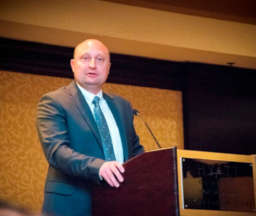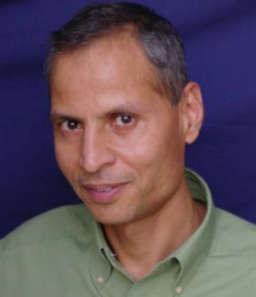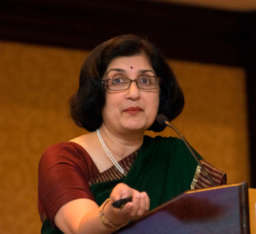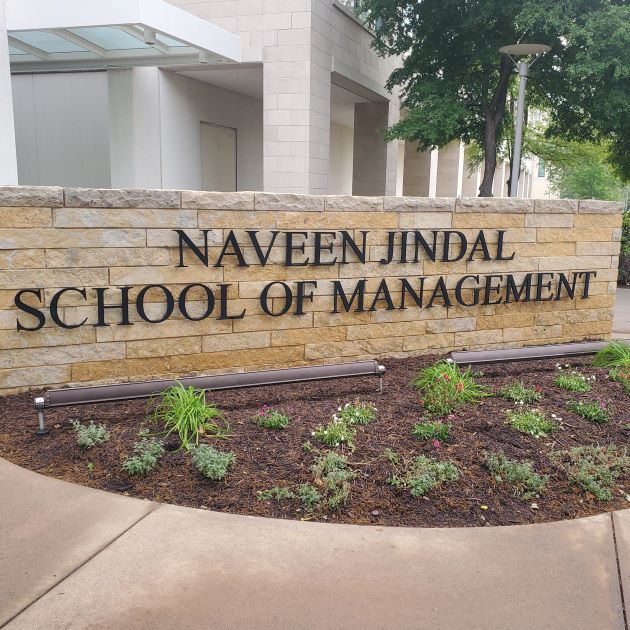Featured speakers include American India Foundation director and JSOM alumna author.

Building sustainability into programs to help India’s poor was the focus of a speech by Venkatesh Raghavendra, senior director of philanthropy of the New York-based American India Foundation, presented at the Naveen Jindal School of Management’s 3C — Conference, Competition and Celebration — event on campus April 21 and 22.
Hosted by the Center for Global Business and the Naveen Jindal Institute for Indo-American Business Studies, the 3C event was part of the Year of India study program, overseen by Hubert Zydoreck, director of the BS in Global Business program.
Raghavendra, a social entrepreneur with nearly 30 years’ experience in philanthropy and development, said AIF’s mission is to effect social and economic change in India as well as to build a connection between India and the United States. The foundation works closely with local communities in India and partners with other organizations to develop programs aimed at making a positive impact on India’s poorest populations.
Part of the challenge of bringing about positive change is to make it sustainable change. AIF has found that partnering with members of the communities it serves is the key. “There are different ways to bring about change,” Raghavendra said, “but change can be sustained when the community is invested in it.”
He focused on two AIF programs in India that are showing positive results — mitigating the impact of seasonal migration on children and improving survival rates of newborn babies and their mothers.

He described seasonal migration as a “mega problem” in India. “Rural families migrate for work, and when the parents leave they take the children with them. Sometimes whole villages move,” Raghavendra said. “The children then are not learning, and sometimes they are even pressed into working.”
AIF has established seasonal hostels at work sites so that the children can attend school. It also has trained members of the community to be teachers so that the children may stay behind and be taught and cared for while their parents migrate for work.
AIF uses the same model in programs to promote survival of mothers and their babies. People in the community are trained in areas such as nutrition in order to share that expertise with new mothers — in their villages and others.

The 3C event culminated with a celebration dinner at the Hyatt Regency in Richardson with keynote speaker, Debjani Mukherjee Biswas, a Jindal School 1993 MS alumna, who spoke on the topic of diversity and gender equity. An international speaker and former executive with PepsiCo and Texas Instruments, Biswas has authored two books, Unleash the Power of Diversity (Bloomington, Indiana: AuthorHouse, 2013) and Miserably Successful No More: Power Over Stress (Meridian, Idaho: Performance Publishing Group, 2017).
Part of the celebration dinner event was the presentation of awards to JSOM students who participated in the competition event, turning in case studies based on business scenarios they might encounter in India.
First place and $1,000 went to Team Humaanav — Cynthia Liu, Anushka Limaye, Minh Chang, Frank Yang and Christina Sundar Singh; second place and $750 went to Team DMHP 3 — Casey Sublett, Nancy Fairbank, Uttara Thiagarajan and Ashley Levy; and third place and $500 went to Team Concept — Nikhil Shyam, Kowshik Mathiazhagan, Karan Shetty, Gopal Ramachandran and Arvind Ananthan.
In addition, these students were awarded money to subsidize the cost of the Summer of India Trip. That program will be built on a faculty-led trip June 3 to June 12 to Bangalore, Jaipur and Delhi, India, for undergraduate students, and a global consulting project in Delhi with Jindal Steel and Power Ltd. June 12 to July 2 in Delhi, India, for undergraduate and graduate students.
“This is a great program to learn about India’s economy, business, culture, people and gain critical consulting skills,” said Susan Philips, coordinator for both the BS in Global Business and MS in International Management Studies programs.





